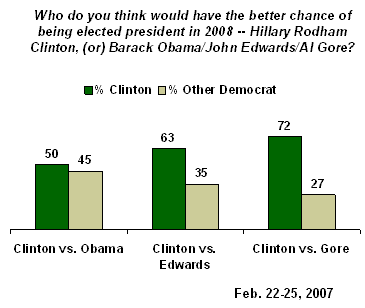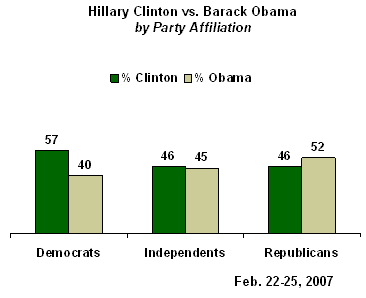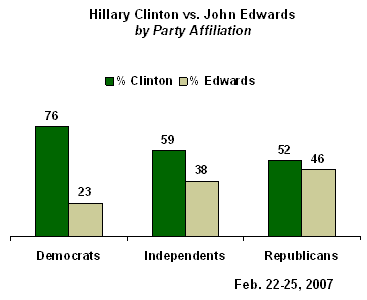GALLUP NEWS SERVICE
PRINCETON, NJ -- A recent Gallup Panel survey shows that Democrats think Hillary Clinton has the best chance of being elected president among the Democratic presidential candidates, followed by Barack Obama and John Edwards. Even as momentum appears to be building in some political circles for an Al Gore-presidential run, less than half of Democrats and only about one-third of Americans think he has a good chance of winning should he run. Overall, Americans are split over which Democrat -- Clinton or Obama -- has the best chance of being elected, with Republicans giving Obama the better odds.
Gallup's Feb. 22-25, 2007 panel survey asked a representative sample of U.S. adults to handicap the 2008 presidential race, giving their views on the chances of several of the prominent Democratic and Republican contenders winning the presidency. The results for the Democratic candidates are shown below. (Results for the same question about the Republican candidates are reported separately. See "Giuliani Edges Out McCain in Perceptions of Viability for Presidency" in Related Items.)
Assuming each of the following Democrats runs for president, please say whether you think each one would have an excellent chance, a good chance, only a slim chance, or no chance at all of being elected president in November 2008. How about -- [RANDOM ORDER]?
| 2007 Feb 22-25 |
Excellent/
|
Slim
|
No
|
No
|
|
% |
% |
% |
% |
|
|
Hillary Rodham Clinton |
74 |
16 |
11 |
* |
|
Barack Obama |
71 |
18 |
10 |
2 |
|
John Edwards |
52 |
34 |
12 |
1 |
|
Al Gore |
31 |
42 |
26 |
* |
|
Bill Richardson |
19 |
51 |
20 |
10 |
|
Joe Biden |
18 |
48 |
24 |
10 |
|
Christopher Dodd |
9 |
49 |
30 |
11 |
|
* = Less than 0.5% |
||||
More than 7 in 10 Americans believe Clinton and Obama have an "excellent" or "good" chance of being elected president. At 52%, Edwards is the only other Democrat who is viewed as having a good chance by a majority of the public.
Even after his recent star turn as a presenter at the Grammys and Oscars, only 31% believe Gore has a good chance of winning, while 42% believe his chances are slim, and 26% think he has no chance at all. The poll was completed before Gore's documentary on global warming, An Inconvenient Truth, was awarded two Oscars Sunday night, so the impact of those wins on his chances, if any, is unclear at this point.
Bill Richardson, Joe Biden, and Christopher Dodd are thought to have better-than-average odds of winning the presidency by fewer than one in five Americans.
To get a better sense of the leading Democrats' perceived electability, Gallup matched Obama, Edwards, and Gore against Clinton, the current frontrunner, to see how they fare against her in a direct comparison on the electability dimension.
Americans are closely divided in their view of whether Clinton or Obama has the better chance of being elected, with 50% choosing Clinton and 45% choosing Obama.
Clinton is seen as having much better odds than either Edwards or Gore. She is seen as a more viable candidate than Edwards by a 63% to 35% margin -- and by a 72% to 27% margin over Gore.

Partisans See Race Differently
Aside from the long-shot candidates, Democrats think each of their party's candidates have a better chance of winning the presidency than do independents and Republicans. And, as the following table shows, Republicans and Democrats handicap the race differently.
|
Ratings of Candidates' Chances of Being
|
||||
|
All
|
Demo-
|
Indep-
|
Repub-
|
|
|
% |
% |
% |
% |
|
|
Hillary Rodham Clinton |
74 |
90 |
69 |
58 |
|
Barack Obama |
71 |
74 |
71 |
66 |
|
John Edwards |
52 |
64 |
48 |
41 |
|
Al Gore |
31 |
44 |
30 |
17 |
|
Bill Richardson |
19 |
23 |
18 |
13 |
|
Joe Biden |
18 |
19 |
17 |
16 |
|
Christopher Dodd |
9 |
12 |
6 |
9 |
The views of Democrats as to which of their party's candidates has the best chance of winning the November 2008 election will likely be a crucial factor in determining how the candidates perform in next year's presidential primaries and caucuses. At this stage, Democrats view Clinton as the most electable of their party's contenders, with 90% saying she has a good chance of winning, compared to 74% who say this about Obama and 64% who say this about Edwards. Fewer than half of Democrats (44%) believe Gore has a good chance of winning the 2008 presidential election.
In contrast, Republicans think Obama has the best shot of winning -- 66% think he has a good chance, compared with 58% who say this about Clinton and 41% who say this about Edwards. Only 17% of Republicans believe Gore has a reasonable chance of emerging victorious should he run.
Independents are closely divided in their views -- 71% think Obama has a good shot to win and 69% think Clinton does. Even when asked to say which of the two has the better chance, independents split down the middle, with 46% saying Clinton and 45% saying Obama.

Clinton's greater perceived electability in direct comparison with Edwards is largely due to her strength among Democrats. Republicans are only slightly more likely to view her chances of winning as better than Edwards'.

When matched against Clinton, Gore is perceived as having a better chance of winning the presidency by independents (34% choose him) than he is by either Republicans (22%) or Democrats (25%). Still, independents are nearly twice as likely to believe Clinton has a better shot of being elected than Gore.
Implications
One of the major themes running through political analyses of the 2004 Democratic nomination campaign was the idea of the strategic voter. Exit polls in early primary states showed Democrats believing John Kerry had the best chance of beating George W. Bush in the general election, which likely played a big part in his winning the 2004 Democratic presidential nomination. Electability likely also played a major part in Bill Clinton's emergence as the nominee from the 1992 Democratic field. When choosing among candidates who generally share similar issue preferences to their own, voters are forced to look for other criteria to make their vote decision. And the candidates' chances of winning -- in addition to their perceived competence, integrity, and leadership skills -- are a reasonable basis on which to make that decision.
The fact that most Americans doubt Gore's chances of winning suggest he would have an uphill battle to fight should he enter the race. Earlier Gallup polling also showed that despite the wave of positive publicity he has received in the last year, Americans' opinions of him are improving only marginally, if at all.
With Clinton currently enjoying a strong lead in the Democratic nomination trial heats and her likely ability to match or exceed her rivals' efforts when it comes to news media coverage, fundraising, and campaign organization in the key primary states, one possible vulnerability for her in securing the nomination would be a widespread perception that she cannot win the general election. Hollywood executive and loyal Democratic party supporter David Geffen recently raised the issue while publicly endorsing Obama. At this point, Democrats do not agree with Geffen's doubts about Clinton's electability, but among the general public there is not a consensus that Clinton is a more viable candidate than Obama. Obama's hopes for winning the party's nomination may hinge to a large degree on convincing Democratic primary voters that he has the best chance of winning the general election.
Survey Methods
Results for this panel study are based on telephone interviews with 1,018 national adults, aged 18 and older, conducted Feb. 22-25, 2007. Respondents were randomly drawn from Gallup's nationally representative household panel, which was originally recruited through random selection methods. For results based on the total sample of national adults, one can say with 95% confidence that the maximum margin of sampling error is ±4 percentage points. In addition to sampling error, question wording and practical difficulties in conducting surveys can introduce error or bias into the findings of public opinion polls.
3. Assuming each of the following Democrats runs for president, please say whether you think each one would have an excellent chance, a good chance, only a slim chance, or no chance at all of being elected president in November 2008. How about -- [RANDOM ORDER]?
A. Delaware Senator, Joe Biden
|
2007 Feb 22-25 |
Excellent |
Good |
Slim |
No
|
No
|
|
% |
% |
% |
% |
% |
|
|
Total |
1 |
17 |
48 |
24 |
10 |
|
|
|
|
|
|
|
|
Republicans |
* |
16 |
51 |
23 |
9 |
|
Independents |
1 |
16 |
46 |
23 |
15 |
|
Democrats |
2 |
17 |
49 |
26 |
5 |
|
* = Less than 0.5% |
|||||
B. New York Senator, Hillary Rodham Clinton
|
2007 Feb 22-25 |
Excellent |
Good |
Slim |
No
|
No
|
|
% |
% |
% |
% |
% |
|
|
Total |
24 |
50 |
16 |
11 |
* |
|
|
|
|
|
|
|
|
Republicans |
15 |
43 |
25 |
17 |
* |
|
Independents |
16 |
53 |
15 |
17 |
-- |
|
Democrats |
37 |
53 |
9 |
1 |
-- |
|
* = Less than 0.5% |
|||||
C. Connecticut Senator, Christopher Dodd
|
2007 Feb 22-25 |
Excellent |
Good |
Slim |
No chance |
No opinion |
|
% |
% |
% |
% |
% |
|
|
Total |
* |
9 |
49 |
30 |
11 |
|
|
|
|
|
|
|
|
Republicans |
* |
9 |
44 |
35 |
11 |
|
Independents |
-- |
6 |
52 |
27 |
15 |
|
Democrats |
* |
12 |
52 |
29 |
8 |
|
* = Less than 0.5% |
|||||
D. Former North Carolina Senator, John Edwards
|
2007 Feb 22-25 |
Excellent |
Good |
Slim |
No chance |
No opinion |
|
% |
% |
% |
% |
% |
|
|
Total |
6 |
46 |
34 |
12 |
1 |
|
|
|
|
|
|
|
|
Republicans |
3 |
38 |
36 |
22 |
* |
|
Independents |
6 |
42 |
38 |
11 |
3 |
|
Democrats |
9 |
55 |
30 |
6 |
* |
|
* = Less than 0.5% |
|||||
E. Former Vice President, Al Gore
|
2007 Feb 22-25 |
Excellent |
Good |
Slim |
No chance |
No opinion |
|
% |
% |
% |
% |
% |
|
|
Total |
7 |
24 |
42 |
26 |
* |
|
|
|
|
|
|
|
|
Republicans |
1 |
16 |
41 |
42 |
* |
|
Independents |
4 |
26 |
44 |
26 |
* |
|
Democrats |
14 |
30 |
42 |
14 |
-- |
|
* = Less than 0.5% |
|||||
F. Illinois Senator, Barack Obama
|
2007 Feb 22-25 |
Excellent |
Good |
Slim |
No chance |
No opinion |
|
% |
% |
% |
% |
% |
|
|
Total |
19 |
52 |
18 |
10 |
2 |
|
|
|
|
|
|
|
|
Republicans |
12 |
54 |
20 |
14 |
* |
|
Independents |
22 |
49 |
21 |
6 |
2 |
|
Democrats |
21 |
53 |
13 |
10 |
3 |
|
* = Less than 0.5% |
|||||
G. New Mexico Governor, Bill Richardson
|
2007 Feb 22-25 |
Excellent |
Good |
Slim |
No chance |
No opinion |
|
% |
% |
% |
% |
% |
|
|
Total |
1 |
18 |
51 |
20 |
10 |
|
|
|
|
|
|
|
|
Republicans |
1 |
12 |
53 |
20 |
14 |
|
Independents |
* |
18 |
51 |
18 |
14 |
|
Democrats |
2 |
21 |
52 |
22 |
4 |
4. Who do you think would have the better chance of being elected president in 2008 -- [ROTATED: Hillary Rodham Clinton, (or) Barack Obama]?
|
2007 Feb 22-25 |
Clinton |
Obama |
No
|
|
% |
% |
% |
|
|
Total |
50 |
45 |
4 |
|
|
|
|
|
|
Republicans |
46 |
52 |
2 |
|
Independents |
46 |
45 |
9 |
|
Democrats |
57 |
40 |
2 |
5. Who do you think would have the better chance of being elected president in 2008 -- [ROTATED: Hillary Rodham Clinton, (or) John Edwards]?
|
2007 Feb 22-25 |
Clinton |
Edwards |
No
|
|
% |
% |
% |
|
|
Total |
63 |
35 |
1 |
|
|
|
|
|
|
Republicans |
52 |
46 |
2 |
|
Independents |
59 |
38 |
3 |
|
Democrats |
76 |
23 |
* |
|
* = Less than 0.5% |
|||
6. Who do you think would have the better chance of being elected president in 2008 -- [ROTATED: Hillary Rodham Clinton, (or) Al Gore]?
|
2007 Feb 22-25 |
Clinton |
Gore |
No
|
|
% |
% |
% |
|
|
Total |
72 |
27 |
1 |
|
|
|
|
|
|
Republicans |
76 |
22 |
1 |
|
Independents |
65 |
34 |
1 |
|
Democrats |
75 |
25 |
1 |
